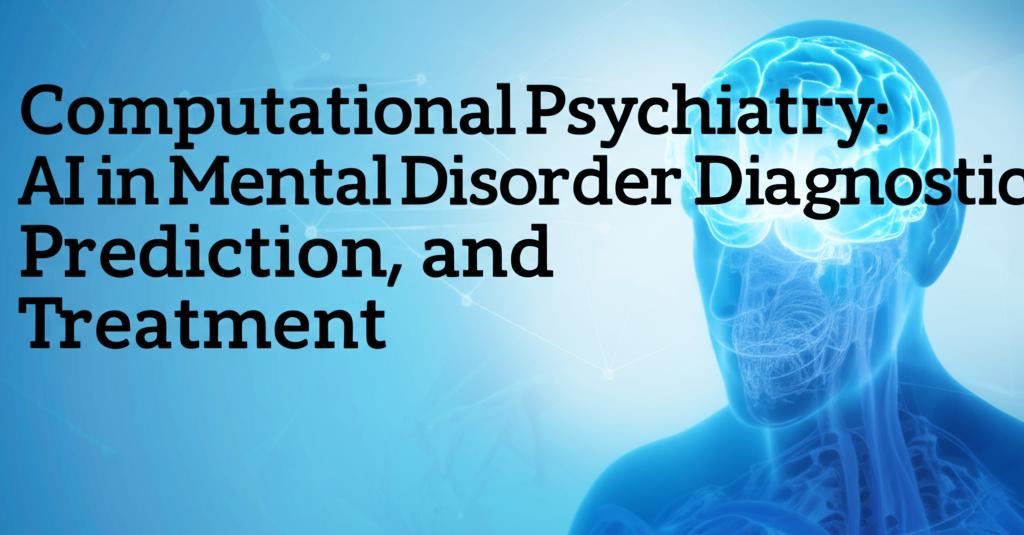Computational psychiatry is rapidly evolving, leveraging artificial intelligence (AI) to transform how mental health disorders are understood, diagnosed, predicted, and treated. This interdisciplinary field combines neuroscience, psychiatry, and computer science, employing mathematical models and computational simulations to unravel the complexities of mental illnesses.
AI in DiagnosticsAI is significantly enhancing the accuracy and efficiency of diagnosing mental health conditions. Traditional diagnostic methods often rely on subjective assessments and clinical observations, which can be time-consuming and require extensive expertise. AI algorithms, including machine learning (ML), natural language processing (NLP), and deep learning, analyze vast amounts of data from various sources to identify patterns and indicators of mental disorders.
- Data Sources: AI models utilize data from electronic health records (EHRs), neuroimaging (like MRI and EEG), genetic information, speech patterns, text analysis (from journals or social media), and even smartphone usage data (such as typing speed or app interactions).
- Improved Accuracy: Studies have shown high accuracy rates for AI in identifying conditions like depression, anxiety, schizophrenia, and bipolar disorder. For instance, AI analysis of speech patterns or online activity has demonstrated up to 90% accuracy in identifying signs of depression or anxiety. Deep neural networks have classified treatment-resistant depression with over 90% accuracy using EEG data.
- Early Detection: AI excels at identifying subtle, early signs of mental illness that might be missed by traditional methods, enabling earlier interventions and potentially better outcomes. Models are being developed to predict the onset of conditions like psychosis in adolescents with promising accuracy.
- Objective Markers: AI contributes to developing more objective diagnostic criteria by identifying biological correlates of mental disorders, moving beyond purely symptom-based assessments.
Predictive analytics powered by AI is a cornerstone of computational psychiatry, aiming to forecast mental health risks and enable proactive care.
- Risk Factor Identification: By analyzing large datasets, AI can identify individuals at high risk for developing mental disorders by considering genetic predispositions, neuroimaging data, and behavioral patterns. For example, IBM Watson Health uses AI to predict schizophrenia onset by analyzing genetic and imaging data.
- Crisis Prediction: AI models can predict mental health crises, such as suicidal ideation, with significant accuracy. Vanderbilt University's suicide prediction model, using hospital data, has shown 80% accuracy. Apps like Cogito's Companion analyze voice patterns to alert care teams to potential crises.
- Personalized Risk Assessment: AI allows for more individualized risk assessments by considering a multitude of personal factors, leading to tailored preventive strategies.
AI is revolutionizing mental health treatment by offering personalized interventions, increasing accessibility, and supporting clinicians.
- Personalized Treatment Plans: AI can help tailor treatment plans by predicting how a patient might respond to different therapies or medications based on their unique data profile. Machine learning models are being used to predict treatment outcomes in patients with psychotic disorders.
- AI-Powered Therapeutic Tools:
Chatbots and Virtual Therapists: AI-driven chatbots (e.g., Woebot, Wysa) offer 24/7 support, delivering cognitive behavioral therapy (CBT) and other evidence-based interventions. These tools can analyze mood data in real-time to personalize sessions.
Virtual Reality (VR) and Digital Games: AI enhances VR applications for treating anxiety disorders and avatar therapy for psychosis. Digital game interventions, accessible via smartphones, can deliver psycho-education and improve mental health, particularly for young people.
- Remote Monitoring and Support: AI enables continuous monitoring of patients' mental states through wearables and smartphone data, allowing for timely interventions if needed. Platforms like Mindstrong monitor smartphone usage to detect depressive episodes early.
- Streamlining Clinical Workflows: AI can assist clinicians by automating tasks, prioritizing patients needing urgent care, and optimizing clinical trial participant selection, thereby improving efficiency and resource allocation.
- Drug Discovery and Development: AI is being used to accelerate the discovery of new medications and therapies for mental disorders.
The field is experiencing rapid growth, with an increasing number of studies demonstrating the potential of AI in mental healthcare. In 2024, over 60% of mental health professionals reported using AI tools, a significant increase from around 10% in 2015. Initiatives like Stanford University's Artificial Intelligence for Mental Health (AI4MH), launched in April 2025, aim to develop responsible AI tools for psychiatric applications and foster their clinical integration. The AI in mental health market is projected to grow substantially, from USD 1.45 billion in 2024 to USD 11.84 billion by 2034.
Challenges and ConsiderationsDespite the immense potential, several challenges need to be addressed:
- Data Quality and Bias: AI models are only as good as the data they are trained on. Biased or small, poorly standardized datasets can lead to inaccurate or unfair outcomes.
- Ethical Concerns: Privacy of sensitive mental health data, transparency of AI algorithms (explainability), and the potential for bias in decision-making are significant ethical hurdles. Ensuring AI tools are used responsibly and do not exacerbate existing health disparities is crucial.
- Reproducibility and Validation: Many AI models developed for mental health lack extensive external validation, which is necessary before widespread clinical adoption.
- Human Element: While AI can provide valuable support, it is generally not seen as a replacement for human therapists, especially for severe conditions. Maintaining the human connection in therapy is vital.
- Regulation and Standardization: Clear regulatory frameworks and data standardization are needed to ensure the safety, efficacy, and ethical use of AI in mental healthcare.
- Over-Diagnosis: There's a risk that AI could lead to the over-diagnosis or medicalization of normal emotional experiences.
Computational psychiatry, driven by AI, holds the promise of revolutionizing mental healthcare. By enhancing diagnostic accuracy, enabling early prediction of disorders, and personalizing treatments, AI can make mental health services more accessible, effective, and proactive. While the progress is exciting, it's crucial to navigate the ethical, technical, and practical challenges to ensure that these powerful tools are integrated into clinical practice responsibly and equitably, ultimately improving the lives of millions affected by mental health conditions worldwide. The focus is shifting towards developing AI not just as a tool, but as a collaborative partner that augments the capabilities of mental health professionals.

